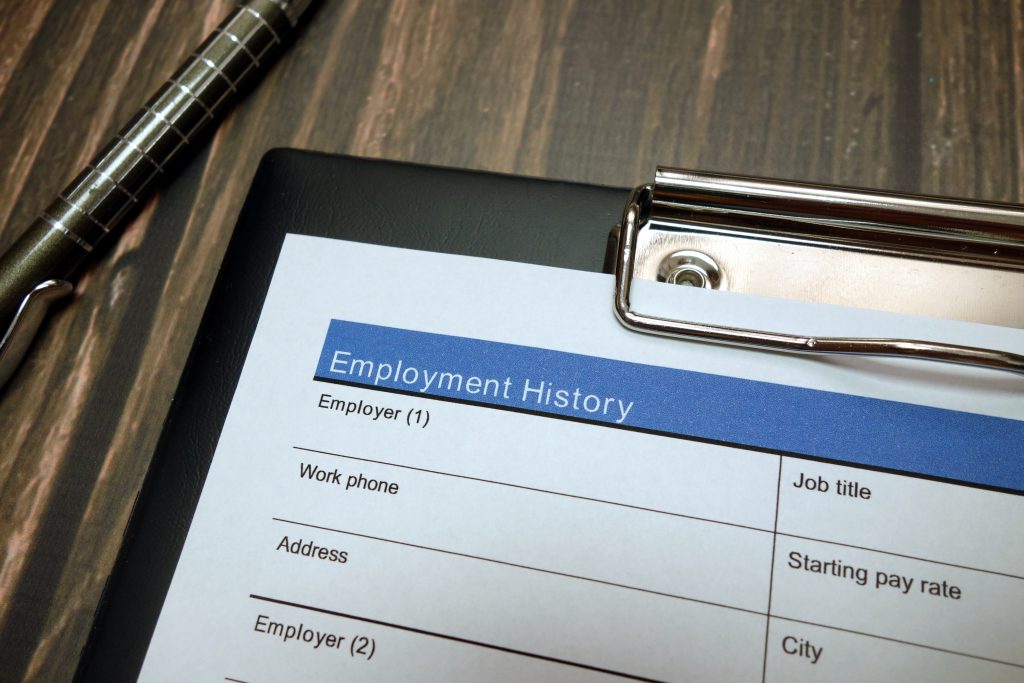With a more competitive job market than ever before, it’s easier to find a number of qualified candidates. However, because finding a job is difficult in the currently oversaturated market, candidates might be prone to lie on their application or resume, or embellish it, to make themselves look more qualified for a job. They might feel that having a stronger employment history will increase their chances of finding a position.
According to a 2014 survey conducted by CareerBuilder, 42% of applicants that lied on their resume did so about the dates of employment, while 34% embellished their job title at a previous job. A background investigation can check the employment background of an employee.
Background Checks for Employment Verification
Background checks can be used to verify an employee’s employment records. This is important for positions that require a certain level of skills that an employee may have gained at a previous job. Qualification verifications can help ensure that an employee can do what they say they can and that the details that they provided on their resume are correct. The employment history for an applicant is usually verified for the previous 7-10 years.
The information that is revealed about the employment history of an applicant can vary. This is because some previous employers will provide detailed information, while others will only supply the basics. It really depends on the company and if they have a policy on sharing employment details. Because of defamation laws, companies are prohibited from stating things that are untrue, so you are most likely getting valid information.
What You Can Learn from an Employment Background Check
The following are seven things that employers can learn about a candidate’s employment history through a background check:
Actual Company
Some potential candidates might completely make up a previous job. A customizable background check can confirm that an applicant worked for the organization they put on their resume.
Work History
An employment history check tells whether the candidate has the experience needed to perform the job. The work history can be a good indicator of future performance so it is imperative to find out if the applicant will be able to handle the job requirements.
Omissions
Sometimes when an employee has a bad experience at a previous job, they will leave it off their resume completely. Employment background verification will discover these omissions, which can raise questions as to why it was omitted. Most resumes should include complete employment history for the last 10-15 years.
Performance
Some background checks can go deeper into a candidate’s employment background by asking about performance, workplace concerns, attitude, and more. This is permissible under the law, which allows employers to ask specific questions about prior work experience. Some states do have more stringent regulations, so it is advisable to check to see what your state’s laws are.
Start and End Dates
Employees might be tempted to embellish their start and end dates at a company, especially if they left abruptly or only held the position for a short time. Background checks confirm employment gaps and sometimes reasons for leaving previous jobs. If a candidate has a history of job-hopping, a background check will alert you.
Job Title and Duties
Say a potential candidate says their last position was a Vice President at a major corporation. Upon receiving the results from a background check, you discover that they held the position of Office Manager instead. Would you be willing to hire them? The issue is not only that the candidate lied, but that they probably are not qualified for the position.
Credentials and Licenses
Certain jobs require a set of academic or industry credentials or a specific license. A background check will confirm that credentials and licenses are accurate and current so you can feel confident in hiring an applicant.
Benefits of An Employment History Check
Employers who simply take the applicant’s word on their employment history may be leaving themselves open to risk. Verifying employment history can help reduce your company’s turnover percentage by limiting the chances of making a poor decision when hiring. It also increases the chances that the new employee will succeed in the job because they have the qualifications.
Potential discrepancies in employment history will show up on a background check. It is important to verify that a candidate’s resume is truthful, so you know exactly what you are getting in a new hire. DataCheck can help verify the employment history of a potential employee.
Tags:

